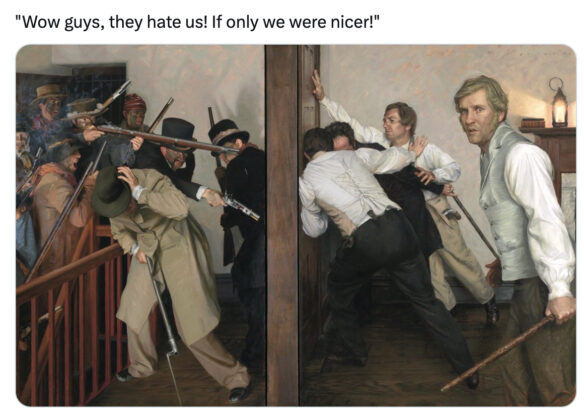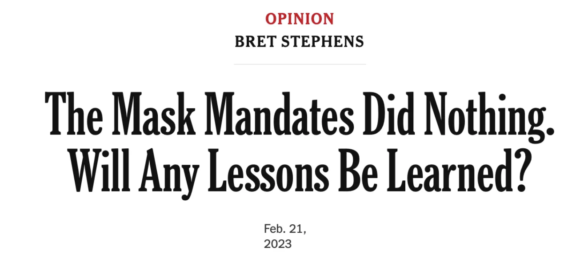(And is that necessarily a bad thing?)
Author Archives: Geoff B.
Dude in a dress goes to Relief Society — what is the right response?
There were multiple social media reports over the weekend from people saying basically, “a dude in a dress is in Relief Society.” These reports may or may not be true, but the point of this post is not to discuss that. This post instead addresses the inevitable time when guys in dresses will go to Relief Society and what the right response of faithful Latter-day Saints should be.
First, let’s make a point that is not obvious: not all cases of dudes in dresses going to RS are the same.
Let’s consider first Paul, who likes to be known now as Paulina. Paul has been in the ward for 15 years, and everybody knows him. He is a loner but a pleasant guy who always shows up for service projects and does his calling. He goes to the temple regularly. He has always been a bit effeminate. He has never dated any of the single women in the ward and seems very socially awkward, but overall a really nice guy. Paul disappears for a year and then comes back in a dress and asks people to call him Paulina. His hair is longer and he/she now has no facial hair. Same nice guy, now dresses like a woman. Because he/she is well-known in the ward, most people feel comfortable around him and lovingly do their best to accept him into the ward family. He/she still has a strong testimony but wants to go to Relief Society.
I think most people would not have an issue with Paulina going to Relief Society. (Or maybe not, tell me what you think).
(Before you give me a lecture on how unlikely this scenario is, I knew a guy just like this in the 1970s growing up in California, so it is not that unlikely at all. He/she was not a latter-day Saint but was a nice man who I knew personally who in the space of a year started calling himself a woman.)
Now let’s contrast Paulina with Pat, who is a political activist man dressed like a woman who shows up one day at church with an attitude, clearly intending to show what a bunch of bigots we Latter-day Saints are. He has a beard and a huge clearly fake bosom and wears a big Hawaiian muumuu. He sighs and makes comments from the back of Sacrament meeting and then announces he is going to Relief Society, and says, “let’s see if any of you Mormons can stop me.” Once he is there, he is noisy and disruptive and loudly asks impolite questions, accusing members of Relief Society of being “Molly Mormons.”
Now obviously Pat is an exaggerated character, but don’t be surprised if you hear of a person like Pat trying to disrupt RS sometime soon (and it may have already happened for all I know).
I hope we can all agree that this Pat character should be kicked out of Relief Society, right?
The point here is that our attitude toward a dude in a dress going to RS depends a lot on how this person behaves, or at least that should be a factor to consider.
Now, let’s see what the Church says on this subject.
Convert points out that joining the Church helped her escape from misogyny
This perspective is so rare — but so true — that I had to bring this to the audience of this blog. A woman grew up in poverty and was constantly sexualized and abused, even from a very young age. But when she joined the Church she began a healing process because the men around her treated her with respect, and it was the first time she had ever been treated with this way by men.
So, perhaps all of those claims of “misogyny in the Church” are a bit overblown compared to the reality of real misogyny.
One of the first things that drew my interest in the church was that not a single missionary made any attempt to engage with me on a sexual level. Attending church was my first experience where trustworthy males were the norm. It was an earth-shattering revelation to me that you could have a culture where men act like that consistently. All the adult males in the church treated me like a daughter — a cherished one — something that my own father had failed to do.
And these experiences continued when I enrolled at Brigham Young University, where I was never once pressured for sex in five years of dating male 20-somethings. In those years of both casual dates and multiple long-term relationships, I was never once struck, called a name, whistled at, groped or complimented on one of my body parts. I went on to work as a secretary for the church’s Family History Department, where men would regularly open doors for me, chide each other for not showing me enough deference, display obvious biases toward my opinions and desires and try to set me up with their sons.
When I finally left Utah, it was with an elevated sense of inherent value that nothing in my childhood would suggest was possible. This is the principal point I wish to make. My childhood left me shot through with fear and shame — innumerable layers of it. I may not recover from all of it in this life. However, the healing and the real happiness I’ve experienced so far is nothing short of miraculous. And it is largely because of my association with the church, and the love bestowed on me by the good and faithful men in it.
Contrary to popular perception, men in leadership capacities in my faith are not “bosses,” but brothers and fathers, which I desperately needed. I don’t know why or how, but I know that I needed to feel this kind of love, particularly from men, who became conduits for God’s own pure and rationally unaccountable love that put my shame to shame.
It was heart-warming to read this perspective at a time when so many critics of the Church have lost all perspective on the extreme issues affecting so many people today.
As the author says: “As a young girl, I grew up surrounded by poverty (at times extreme), physical violence and drugs. I don’t mean the psychological trauma of sitting through an uncomfortable discussion about the law of chastity. I mean the kind where someone chokes you after you complain that their pornographic video is keeping you awake on a school night.”
Yes, the solution to the world’s problems is more Jesus and more people joining the Church of Jesus Christ of Latter-day Saints.
Who painted this amazing painting?
I saw this on a post on Twitter, and I think it may be the best summation ever of the history of Latter-day Saint persecution at the hands of “the world.” (The comment is not from the person who painted this painting but instead from the person who posted this painting on Twitter. I thought his comment relevant to the painting itself).

I am just going to make the following point: Jesus Christ himself warned us in the scriptures multiple times that his followers would suffer persecution, even sometimes from our friends.
Matthew 10: 34-36: “34Think not that I am come to send peace on earth: I came not to send peace, but a sword. 35For I am come to set a man at variance against his father, and the daughter against her mother, and the daughter in law against her mother in law. 36And a man’s foes shall be they of his own household.
Modern-day revelation says the following: (D&C 101)
1 Verily I say unto you, concerning your brethren who have been afflicted, and apersecuted, and bcast out from the land of their inheritance—
2 I, the Lord, have suffered the aaffliction to come upon them, wherewith they have been afflicted, in consequence of their btransgressions;
3 Yet I will own them, and they shall be amine in that day when I shall come to make up my jewels.
4 Therefore, they must needs be achastened and tried, even as bAbraham, who was commanded to offer up his only son.
5 For all those who will not aendure chastening, but bdeny me, cannot be sanctified.
The message I receive is: Latter-day Saints who follow the prophet will be tested and will have to suffer persecution. Part of the test is that we should maintain principles of kindness and charity, even for our declared enemies, but at the same time, we should not believe that abandoning the precepts of our faith is the solution. Another part of the test is that we must become better Saints even as we suffer persecution.
Joseph Smith said it best:
“The Standard of Truth has been erected; no unhallowed hand can stop the work from progressing; persecutions may rage, mobs may combine, armies may assemble, calumny may defame, but the truth of God will go forth boldly, nobly, and independent, till it has penetrated every continent, visited every clime, swept every country, and sounded in every ear, till the purposes of God shall be accomplished, and the Great Jehovah shall say the work is done.”
(History of the Church, 4:540).
This message still applies in our time.
(I am going to assume that almost all readers know that this painting is a depiction of the mob that attacked and killed Joseph and Hyrum Smith in Carthage, Illinois on June 27, 1844, but for those of you who may not know, now you know).
NY Times finally accepts mask mandates did nothing. What does this mean for Church members?
Almost three years after the world-changing COVID-19 pandemic began, the New York Times finally accepted reality Tuesday.

This op ed, which can be read in its entirety here, included this:
When it comes to the population-level benefits of masking, the verdict is in: Mask mandates were a bust. Those skeptics who were furiously mocked as cranks and occasionally censored as “misinformers” for opposing mandates were right. The mainstream experts and pundits who supported mandates were wrong. In a better world, it would behoove the latter group to acknowledge their error, along with its considerable physical, psychological, pedagogical and political costs.
Don’t count on it. In congressional testimony this month, Rochelle Walensky, director of the Centers for Disease Control and Prevention, called into question the Cochrane analysis’s reliance on a small number of Covid-specific randomized controlled trials and insisted that her agency’s guidance on masking in schools wouldn’t change. If she ever wonders why respect for the C.D.C. keeps falling, she could look to herself, and resign, and leave it to someone else to reorganize her agency.
That, too, probably won’t happen: We no longer live in a culture in which resignation is seen as the honorable course for public officials who fail in their jobs.
But the costs go deeper. When people say they “trust the science,” what they presumably mean is that science is rational, empirical, rigorous, receptive to new information, sensitive to competing concerns and risks. Also: humble, transparent, open to criticism, honest about what it doesn’t know, willing to admit error.
The C.D.C.’s increasingly mindless adherence to its masking guidance is none of those things. It isn’t merely undermining the trust it requires to operate as an effective public institution. It is turning itself into an unwitting accomplice to the genuine enemies of reason and science — conspiracy theorists and quack-cure peddlers — by so badly representing the values and practices that science is supposed to exemplify.
This was exactly the point that many of us made in opposing mask mandates from the beginning of the pandemic.
